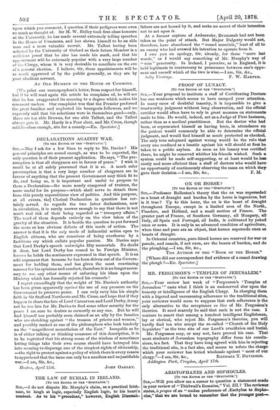DECLARATIONS AGAINST WAR.
[To THE EDITOR OF THE "SPECTATOR.")
Srn,—May I ask for a few lines to reply to Mr. Davies ? His general principles are sound enough, as was to be expected, the only question is of their present application. He says, "The pre- sumption is that all clergymen are in favour of peace." I wish it could be at all safely presumed that it is so. A much safer presumption is that a very large number of clergymen are in favour of anything that the present Government may think fit to do, and being so, it is important and useful to propose to them a Declaration—the more nearly composed of truisms, the more useful for its purpose—which shall serve to detach them from this purely superstitious view of politics. And this purpose, at all events, the Clerical Declaration in question has cer- tainly served. As regards the two latter declarations, now in circulation, it is surely answer enough to say that there is not much real risk of their being regarded as "trumpery affairs." The need of them depends entirely on the view taken of the gravity of the situation. It is beside the question to put forward the more or less obvious defects of this mode of action. The answer is that it is the only mode of influential action open to English citizens, who are conscious of being overborne by a factitious cry which enlists popular passion. Mr. Davies says that Lord Derby's speech outweighs fifty memorials. No doubt it does, but Lord Derby has ceased to be Foreign Minister, becalm he holds the sentiments expressed in that speech. It is an odd argument that because he has been driven out of the Govern- ment for holding them, and has given the most convincing reasons for his opinions and conduct, therefore it is no longer neces- sary to use any other means of enforcing his ideas upon the Ministry which has formally rejected his counsels !
I regret exceedingly that the weight of Mr. Davies's authority has been given apparently against the use of any pressure on the Government to preserve peace. I can only envy him his simple faith in Sir Stafford North cote and Mr. Cross, and hope that if they happen to share the fate of Lord Carnarvon and Lord Derby, itmay not be too late for Mr. Davies to find some other security for the peace I am sure he desires as earnestly as any one. But he will find himself too probably soon claimed as an ally by the fanatics who are shrieking against "the treason of priests and women," and possibly ranked as one of the philosophers who look tenderly on the "magnificent monotheism of the East." Incapable as he is of either talking or thinking nonsense of this description, it is to be regretted that his strong sense of the wisdom of sometimes letting things take their own course should have betrayed him into seeming to disparage one of the simplest rights of citizenship, —the right to protest against a policy of which there is every reason to apprehend that the issue can only be a needless and unjustifiable war.-1 am, Sir, &c.,


































 Previous page
Previous page